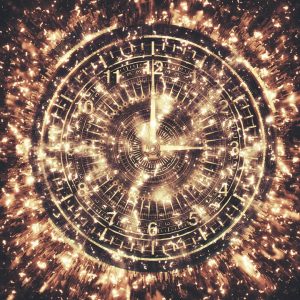
TheDigitalArtist (https://pixabay.com/illustrations/time-background-futuristic-1756003/)
Guest Post by Eve Taft
I firmly believe that humans need science fiction. I think it inspires us, in a both a broad and narrow sense—Star Trek led not only to kids who dreamed of being astronauts but also, quite simply, to tablets like Geordi LaForge’s. Scifi forces us to imagine what could be, what mustn’t be, and what might save the world, if only it would be.
And science fiction tells us something about ourselves. If we look through the scifi canon next to a historical timeline, it can tell us something about what the future looked like to readers and writers of any given time—which can tell us a lot about where their heads were.
Take, for instance, the science fiction of the mid-1900s. It was sleek and optimistic. The Enterprise explored the galaxy and (mostly) followed the prime directive. The future meant exploring, creating, and becoming better humans. War, hunger, inequality—all these struggles were declared to be things of the past.
The scifi I grew up with was different. My generation (the dreaded millennials) didn’t care about Walt Disney’s Tomorrowland. Instead, we devoured The Hunger Games, The Maze Runner, and The Walking Dead. We were so jaded about the end of the world that we joked about 2012, made memes about the rapture (and the subsequent postponement of it—Harold Camping seems to turn up every few years, reminding us that the end is nigh).
We devoured apocalypse stories. Even kids’ movies painted the future as a devolution of the earth and humankind—look at Wall-E. It was pretty clear that no matter how great new tech was, someone (probably the US government) would use it to subjugate others. At the very least, our muscles would atrophy in front of huge TVs.
We were contemplating the zombie apocalypse while we chewed over evidence for climate change that was becoming incontrovertible, watched our nation tumble into debt, and kept hearing about how the bees were dying. We grew up in front of big screen TVs that blared the end of the world 24/7. We didn’t want fiction about an optimistic future—we were pretty sure we wouldn’t get one. Hell, we weren’t sure we’d get a future at all.
The aught years and the early twenty-teens weren’t the first time speculative fiction (which, I’d argue, is a larger genre that contains scifi) has been pessimistic. We’ve seen that before with 1984 and the like. But those are the years I know, the years I spent devouring any book about AI that I could.
In the last decade, though, something changed. Scifi of the present is cautiously optimistic. See Ramez Naam’s Nexus trilogy. Is there war and terrorism, misuse of the nexus technology that allows brain-to-brain contact? Absolutely. We lose a few of our heroes along the way, and we’re forced to confront several ethical dilemmas. But Naam, in the end, gives us hope—monks meditating with Nexus-linked brains, children learning at breakneck pace, a world that can we so much brighter if we don’t allow those who would use technology to subjugate to win.
And the masterpiece that was Mad Max: Fury Road showed us that even post-apocalypse, even in a beautifully sunny dystopia where these seems to be no hope left, there will always be those of us who rise and rebel.
The science fiction of today feels more realistic than The Matrix and less shiny and unreal than Tomorrowland. It tells us that whatever we create can and will be used for evil. But, it tells us, that evil can be beat. For every NSA, there will be an Edward Snowden. And the Snowdens of the world can win.
Part of this, I think, is because science fiction had become aware of itself as a genre. Post-modernism has made damn near everything meta, anyway. But when science fiction is aware of itself, it knows that it’s teaching us how to handle advances in tech and changes to the definition of big concepts like life and humanity. And instead of simply warning us, it’s telling us that we have choices—to stay stuck in the past, to use our inventions for evil, or to move forward as best we can without hurting each other.
In short, current scifi does something that I’ve never seen before—it doesn’t treat the apocalypse as a foregone conclusion. It tells us that we get to pick between Tomorrowland and the Matrix.
Science fiction has stopped being a passive commentary or a dire warning. Now, it’s trying to shape the future by showing us that we always have a choice.
Does this self-awareness mean something about us? Does it mean that humans have matured, that we’re getting closer to seeing ourselves and our trials, failures, and moments of success from the outside?
I don’t know. Maybe it’s arrogant to assume anything of the kind. But I know this: scifi gives me hope.
Science fiction continues to lead us into the future. Whether it promises zombie apocalypses or glittering cities on Mars, it is our North Star, the beacon we follow into the murk of what is to come.
For now, it seems to be leading resolutely into a future that won’t be free of strife, of misuse of breath-taking inventions, of suffering—but a future that can be brilliant, even if we have to fight tooth and nail for it.
Eve Taft is a writer who lives in Minneapolis, Minnesota. She is currently carrying on a love affair with James Joyce and writing fantasy novels. Find her at: http://www.facebook.com/EveTaft/.
Follow us online: